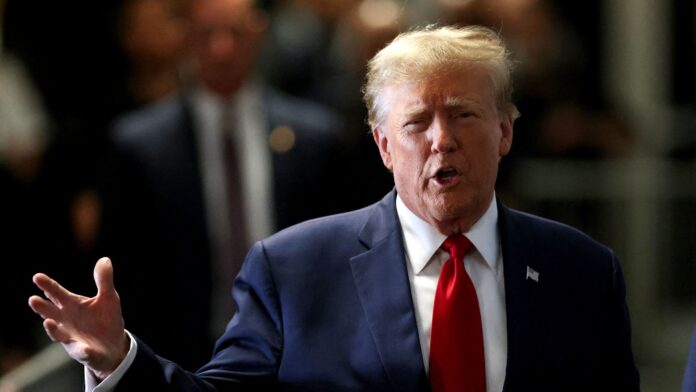Over the weekend, former President Donald Trump stirred controversy with comments suggesting the United States could face a “bloodbath” if he’s not victorious in the 2024 presidential race. Speaking in Dayton, Ohio, Trump hinted at dire consequences, particularly for the automobile industry, if President Joe Biden secures a second term. These remarks have ignited a firestorm of criticism, with many interpreting them as an ominous prediction of violence rather than a mere economic forecast.
Trump’s campaign quickly attempted to quell the uproar, arguing that the former president was speaking metaphorically about an economic downturn in the auto sector, not predicting literal bloodshed. They accused critics and the media of misinterpreting Trump’s words, labeling them as “LIARS” and alleging manipulation of his statements.
However, this explanation hasn’t pacified Trump’s detractors, who point to his history of incendiary rhetoric and its potential to incite violence. Critics argue that Trump’s choice of words, particularly given his track record, warrants scrutiny and concern rather than the benefit of the doubt. The phrase “bloodbath,” they assert, cannot be divorced from its violent connotations, especially when uttered by someone with Trump’s influence and following.
This isn’t the first time Trump’s speech has sparked controversy or fears of incitement. From telling the Proud Boys to “stand back and stand by” during the 2020 presidential debates to urging his supporters to march on the Capitol on January 6, 2021, Trump’s words have often been interpreted as calls to action by his most fervent supporters. His rhetoric has repeatedly blurred the lines between political hyperbole and potential calls for violence.
Critics argue that this pattern of behavior should inform how we interpret Trump’s latest comments. The use of the word “bloodbath,” even in an economic context, is seen by some as a dog whistle to his base, signaling readiness for conflict should the election not go his way. This interpretation is bolstered by Trump’s own actions and statements, which have consistently pushed the boundaries of political discourse into dangerous territory.
The debate over Trump’s “bloodbath” remark underscores a broader concern about the state of political rhetoric in the United States. As the 2024 presidential race heats up, the language used by candidates and their campaigns will be scrutinized for potential implications beyond their literal meaning. In a nation still reeling from the events of January 6, 2021, the power of words cannot be underestimated, nor can the responsibility of those who wield them.
As Trump floats the possibility of a “bloodbath” in the event of his electoral defeat, the question remains: Are we witnessing a dangerous escalation in political rhetoric, or is this another instance of Trump’s penchant for provocative language? Regardless of the answer, the controversy serves as a reminder of the volatile mix of politics and rhetoric in today’s polarized climate, where words can have consequences far beyond their intended scope.



